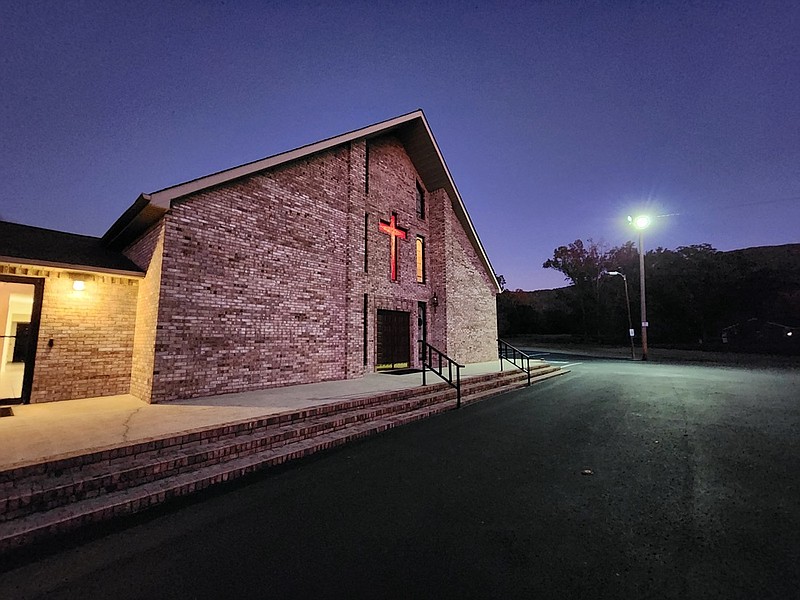Note: This story was updated at 8:45 p.m. to correct the last name of Sulphur Springs pastor Brenda Woods.
Several Chattanooga-area congregations have formally begun the process of leaving the United Methodist Church. Following years of often bitter debate over human sexuality, citing a commitment to a traditional reading of scripture, the local churches join hundreds nationwide in moving to depart the denomination, which is among the largest in the United States.
Under a temporary denominational rule that allows them to disaffiliate but retain their church property, dozens of congregations in Georgia and parts of West and Central Tennessee have already been approved to leave.
Now, in the Holston Conference, a body representing 800-plus United Methodist Churches from Chattanooga through East Tennessee and into parts of greater Appalachia, the first churches have filed paperwork indicating an intention to break from the denomination. Though they represent only a small fraction of United Methodist congregations in the area, more may follow.
The product of a 1968 merger of two denominations, and tracing its roots to 18th century English theologian John Wesley, the United Methodist Church claims more than 12 million members on four continents.
Earlier this year, a group of theologically conservative Methodists, who call themselves the Wesleyan Covenant Association, helped formally launch the Global Methodist Church, which they hope will emerge as a viable new denomination in part by absorbing congregations that leave the United Methodist Church.
At issue specifically are the ordination of gay clergy and church sanction of same-sex marriage. The practices are banned under United Methodist Church law, but clergy around the country have disobeyed the policies in protest, frustrating theological conservatives who feel the rules are not adequately enforced. Stiffer enforcement is among the promises of the Global Methodist Church.
Still, the debate over LGBTQ issues is "the presenting symptom for a much deeper problem," said Chuck Griffin, a Virginia pastor and chairman of the Holston chapter of the Wesleyan Covenant Association, which has promoted disaffiliation efforts in the region. Griffin said the ongoing tumult reflects the fact that the United Methodist Church "is taking people with two different views of how to handle scripture and putting them in the same tent together."
In the Holston Conference's Scenic South District -- which comprises roughly 65 United Methodist congregations in Sequatchie, Bledsoe, Marion and Hamilton counties, among others -- at least seven churches have formally entered or passed through a "discernment" phase, district superintendent Reed Shell said by phone Tuesday, referring to mandatory 90-day period of reflection churches considering disaffilation must undergo before taking a congregational vote.
Griffin, who said his own Holston View United Methodist Church in Weber City, Virginia, is in this discernment phase, sees the requirement as "a little obnoxious," since he feels many churches have already been reflecting on leaving, for years in some cases.
But local United Methodist Church officials, wary of the emotionally charged nature of the conflict, hope congregations will use the time to reflect and, potentially, reconsider.
"This is a major decision," Shell said. "We don't want it to be entered into very lightly."
Cherry picking
Those who consider themselves traditionalists in the Methodist faith believe the Bible plainly disapproves of homosexuality. They accuse liberal clergy of theological sloppiness, of cherry-picking from a text with thousands of years of history and adapting it to conveniently suit their modern sensibilities.
Sulphur Springs United Methodist Church is among the Scenic South District congregations in discernment. It's a small congregation in Whitwell, Tennessee, a town of about 2,000 people roughly 40 minutes northwest of Chattanooga by car.
With the church choir audible from her office, where she sat after leading Bible study Wednesday evening, Pastor Brenda Woods said it's time to leave the United Methodist Church, her home of three decades.
On questions of human sexuality, the "Bible speaks to our age just as it does to every age," Woods said. "I don't think there is a new dispensation for 2022."
Others, like St. Elmo United Methodist Church Pastor Walter, say the Jesus of the Gospels embraced people on the margins of society. And even as theological conservatives concede that point and insist all are welcome in their church, many LGBTQ Christians have reported profoundly negative experiences.
Growing up in a fundamentalist Church of God in Louisiana, Danny Tullier was not accepted as a gay congregant.
In the church, "I was told that my attraction to other men was not just wrong but evil, and there was no category that was worse then being a homosexual," he said by phone Thursday. "You could be a thief, a murderer, a rapist, a child molester, but the worst was being a homosexual."
As a teenager, Tullier considered suicide, he said. Instead he joined the military, hoping it would make him fit in. ("It didn't work"). In 2001, he was talking theology with two lesbian friends, he said, who recommended he check out St. Elmo United Methodist Church.
Tullier recalls walking into a sermon that listed all the different sorts of people God loved. Gay people made the list.
"I'd never heard someone say I was loved from behind a pulpit," he said.
He'd found his spiritual home.
Now, he's become a certified lay minister, he said, and is preparing a Sunday school course seeking to present alternative views on Bible sections -- "clobber passages," he calls them -- often cited by those who see homosexuality as a grave sin.
For example, many deploy the Genesis tale in which God destroys the cities of Sodom and Gomorrah as evidence that the Bible prohibits homosexuality. But Tullier said a more "objective" reading would recognize that the passage does not clearly identify homosexuality as the reason for God's wrath. In fact, other Biblical passages alluding to the events suggest the offending sins were rape and a failure of hospitality, he said.
The Bible is famously difficult to interpret, but when in doubt, Tullier falls on Jesus's two "great commandments" -- of loving God and loving others. When Tullier struggles with scripture, he said he uses those principles as a "spiritual colander" to ensure his reading is accurate.
"Scripture never changes," Tullier said. "Scripture is not wrong, but our interpretation is fallible."
St. Elmo United Methodist Church has not discussed disaffiliating, said Weikel, the pastor.
Conferences delayed
Like other religious groups, the United Methodist Church has debated positions on same-sex marriage and related questions for decades. Church law dating to the 1970s states that "the practice of homosexuality is incompatible with Christian teaching" -- a view reflected in, for example, its ban on the ordination of "self-avowed practicing homosexuals."
With heightened attention on LGBTQ rights in political and cultural life, conflict intensified in recent years as clergy around the U.S. protested and defied church rules they disagreed with. In 2016, a western conference of the church elected an openly gay bishop. In 2018, a pastor at St. Marks United Methodist Church in Chattanooga was fired after officiating a same-sex marriage.
In 2019, the United Methodist Church convened a special denomination-wide conference specifically intended to address rifts over questions on human sexuality. But hopes for reconciliation were dashed as delegates from around the world voted to affirm traditional church policy, which many dissenting clergy indicated they would not honor.
A split of the church appeared likely, and delegates established a policy, sun-setting at the end of 2023, by which congregations seeking to leave could retain control of their church property -- avoiding a "trust clause" in the United Methodist rule book that would ordinarily require them to leave the property to the denomination.
Church leaders anticipated further talks, but the pandemic repeatedly delayed denomination-wide conferences at which an amicable, systematic accord might have been reached, and in the Spring of 2022, a group of traditionalists -- organized largely through the Wesleyan Covenant Association -- formally launched Global Methodist Church. This provided frustrated, theologically conservative congregations a potential new home in which to enact their understanding of Methodism.
According to Jeff Jones, the finance committee chairman and disaffiliation coordinator at a church in Dunlap, Tennessee, the change to the Global Methodist Church would allow his congregation to pay less in membership costs while retaining local control of church property.
While his Chapel Hill United Methodist Church is a "rural and typically traditional" congregation, Jeff Jones said its decision to enter the disaffiliation process was motivated by a desire to move beyond the "discord" and "bring an end to the schism, so we can return our full focus to our mission."
Charles McEntyre, a retired former Tennessee Valley Authority environmental engineer and vice-chairman of the Holston chapter of the Wesleyan Covenant Association, spearheaded disaffiliation talks at Whitwell's Sulphur Springs United Methodist Church, of which he is a longtime active member.
This fall, following a congregational straw poll, church leadership voted to move for disaffiliation, he said by phone. The next day, he said, he had an errand to run in Chattanooga, and so he filed paperwork in person at the office of district superintendent Shell.
McEntyre said leaving the United Methodist Church would be "heartbreaking in many ways." But it is the best way to resolve the "chaos" in a United Methodist Church where some people "don't think the rules apply to them," he said.
Following the discernment period, a church, under denomination rules, would require a two-thirds vote of the congregation to disaffiliate. McEntyre said he expects Sulphur Springs United Methodist Church to easily reach the threshold. As with some other local congregations currently in discernment -- like First United Methodist Church in Cleveland, Tennessee -- leadership envisions a congregational vote shortly after the new year.
Who leaves
Congregations that vote to leave would decide whether to become independent or join another denomination, like the Global Methodist Church. Their departure must also be approved at a meeting of the Holston Conference, though Tim Jones, the conference communications director, said by phone Wednesday that is unlikely to pose a significant barrier.
The December 2023 expiration date on the rule allowing congregations to leave with their church property has injected disaffiliation efforts with a sense of urgency. But concerns that the window of opportunity is limited are misguided, and rooted in mistrust, said Nathan Malone, pastor of Christ United Methodist Church on East Brainerd Road.
"That kind of talk feels like being at the car sales place, where they are saying 'you gotta take this deal today,'" said Malone, whose roughly 5,000-member church is among the largest in the region. He sees disaffiliation talk as a harmful distraction and feels it obscures the enduring possibility that feuding church factions could come to an accord.
"It drains energy, drains focus, divides people," he said by phone. "It ends up making us look more like the culture, rather than trying to be something other than the culture."
But in the Holston Conference, laypeople tend to be more theologically conservative than clergy, said Griffin, and he thinks some pastors have not been transparent with congregants about their opening to leave the denomination.
The Holston chapter of the Wesleyan Covenant Association has hosted informational sessions for interested parties around East Tennessee, including in Chattanooga in early October. Griffin said the most common question he gets from fellow theological conservatives is: "why do we have to leave?" In response, he compares the United Methodists' theologically liberal wing to a spouse who says they will no longer abide by their marriage vow, yet insists on staying in the house.
"You look around and find out for some reason there's no judge or jury to help you resolve it," he said. "Eventually, you just have to move out."
Contact Andrew Schwartz at aschwartz@timesfreepress.com or 423-757-6431. Follow him on Twitter @aonSchwartz.

